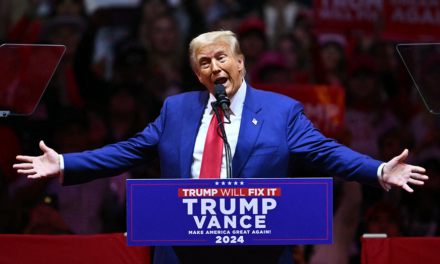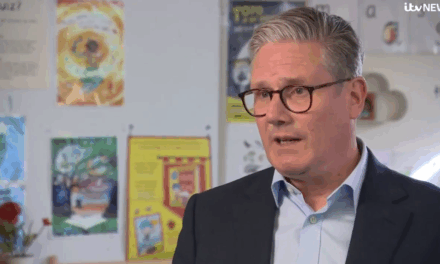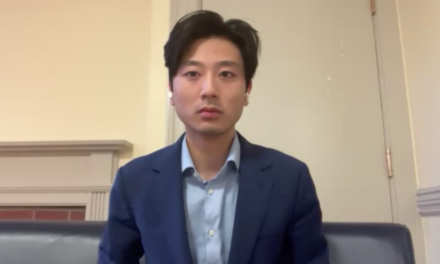Kari Lake, the prominent political figure and former gubernatorial candidate in Arizona, has expressed her admiration for the Voice of America (VOA) Persian news service, stating that it is “rising to the occasion” amid the ongoing tensions between Iran and Israel. The escalating conflict in the Middle East has raised questions about media coverage and the role of international news organizations in providing reliable information to audiences affected by these geopolitical struggles.
As the situation continues to evolve, Lake’s comments shed light on the critical role that media plays in shaping public perception and understanding of complex international issues. Her endorsement of VOA emphasizes the importance of accurate reporting in a time fraught with misinformation, propaganda, and disinformation, especially in regions where state-controlled media can skew narratives.
The VOA Persian service, launched in 2003, aims to provide an independent source of news to Persian-speaking audiences, particularly in Iran, where government censorship restricts free expression. With the intensifying conflict between Iran and Israel, the service has focused on delivering timely updates and in-depth analysis, attempting to bridge the gap in coverage created by domestic outlets that serve the interests of the Iranian government.
Lake highlighted the significance of providing accurate information to the Iranian populace, who have limited access to unbiased reports about the international implications of the Iran-Israel conflict. She acknowledged that, in these turbulent times, media organizations like VOA serve not only as conduits of information but also as platforms for dialogue and understanding, fostering a more informed public.
The Israeli-Palestinian conflict has seen renewed violence lately, with the ramifications spilling over into regional politics and affecting relationships with countries like Iran. The nuanced landscape of Middle Eastern geopolitics necessitates careful reportage, ensuring that audiences receive a comprehensive picture of events. This is where Lake believes that the VOA Persian service has succeeded.
In her remarks, she commended the service for its extensive coverage, which encompasses not only the immediate developments but also the historical context and consequences of the conflict. “People need to know the background of what’s happening,” she stated. “It’s essential for understanding why these tensions exist and how they impact all of us.”
Many observers agree that the dynamics between Iran and Israel have been a longstanding issue, influenced by ideology, territorial disputes, and longstanding grievances. The recent escalation in hostilities has prompted media outlets to reassess how they convey these complex relationships to readers and viewers.
In this regard, Lake’s recognition of VOA’s efforts elevates the discussion around the importance of independent journalism. In an age where misinformation can spread quickly across social media platforms, the VOA’s commitment to journalistic integrity offers a reliable alternative for those seeking the truth behind the headlines.
Furthermore, as political figures and public influencers weigh in on the media’s portrayal of international conflicts, this can set a tone for broader public discourse. Lake’s validation of VOA’s role not only takes on political significance but also aligns with a growing awareness of the challenges that journalists face in regions with oppressive regimes. Coverage can be not only difficult but perilous in these environments, making the work of independent news agencies even more valuable.
The ongoing conflict serves as a reminder of the necessity for diverse viewpoints in the media landscape. Analysis and coverage that emanate from the ground level in conflict zones can often vary drastically from that provided by official sources. Lake’s support of VOA emphasizes the need for robust media presence amidst the clashing narratives and propaganda that can often overwhelm truth.
The Iranian government’s efforts to suppress dissenting voices and limit scrutiny over their policies amplify the essence of what the VOA Persian service provides. This is crucial for Iranians inside the country who may wish to better understand the events shaping their lives beyond the filtered news from state outlets. By providing credible and well-rounded perspectives on both the Iran-Israel conflict as well as broader regional issues, the VOA highlights the significant responsibility that comes with international journalism.
Lake remarked that the importance of free and independent media extends beyond national boundaries, particularly when it comes to covering events that resonate on a global scale. The ability to share information across borders enhances public awareness, contributes to informed dialogue, and underlines the shared humanity in the face of global crises.
As the international community continues to grapple with the implications of the conflict, the discourse surrounding it will likely evolve. The prioritization of accurate reporting will remain paramount, and services like VOA’s will play a crucial role in shaping how these events are understood both regionally and internationally.
In light of growing digital spaces and myriad media channels, audiences are presented with a unique challenge—navigating the sea of information to find reliable and fact-checked sources. Lake’s acknowledgment of VOA reflects a light on the pathways that can be forged through trusted journalism, offering audiences not just news, but also a more profound understanding of the interconnectedness of global events.
As we observe the development of the Iran-Israel conflict and its ramifications, the role of journalism cannot be underestimated. Through the dissemination of accurate information, news organizations can foster dialogue, promote understanding, and help forge a path toward resolution. With influential voices like Kari Lake advocating for reputable media, it emphasizes the collaborative effort needed to keep the conversation alive while navigating the complexities of international relations.
In conclusion, as tensions continue to simmer in the Middle East, the commitment of organizations like the VOA to provide clear and impartial coverage is essential to informing the public. The challenges posed by misinformation create an imperative for responsible reporting that transcends ideological barriers. As we witness these pivotal historical moments, the words of leaders who uplift credible journalism bring hope for a more informed discourse, enabling audiences to understand, engage, and respond to the conflicts shaping our world.
































